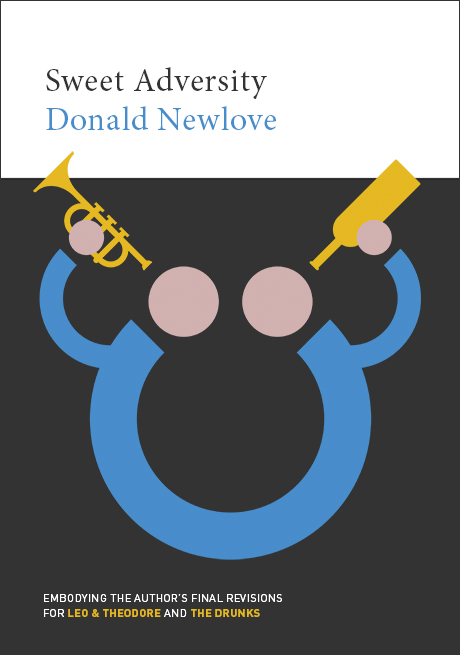I was knocked out on first reading of Sweet Adversity (1978), by Donald Newlove, who died Aug. 17 at age 93.
It’s about co-joined twins who love Louis Armstrong, play jazz in the 1930s and arrive New York’s Lower East Side in the early 1960s, where one of them sobers up. Besides the unique story, it’s the novel’s language that dazzles — intricate, high-spirited sentences that conjured unusual images and ringing perceptions in a continuous, unpredictable stream. It’s hilarious, delirious and heartbreaking, a classic American serio-comedy operating on several levels (twins Leo and Teddy are stand-ins for Tolstoy and Dostoyevsky) and seems to me not as much appreciated, recognized or read for its verbal largess, deft characterizations, repartee and solid insights as the work deserves (and rewards).
Sam Robert’s NYT obit claims all Newlove’s books were about “drunkenness.” Though he is both the poet and scourge of drinking, and deservedly hailed for the self-scouring Those Drinking Days: Myself and Other Writers, (out-of-print, hardcover listed at Amazon for $578.99), it doesn’t seem quite true true. For instance, “The Welles Requiem” in Starlight Photoplays is a carnivalesque tale weaving together bits of Orson in many of his roles, and Eternal Life is accurately (!) subtitled “An Astral Love Story.” Love of a deep, searing — drunken? — kind registers prominently in most everything of his I’ve read.
“I rewrite everyone when I read — and retongue all Latin into Anglo-Saxon,” Newlove mentioned in Painted Paragraphs Inspired Description for Writers and Readers: A Handbook for the Soul, one of his three entertaining yet relatively casual books examining the work of others (the others are Invented Voices, a celebration of dialogue from novels and the movies, and First Paragraphs, selected from the world’s literature). Do not let that suggest he stripped verbiage down. Far from the minimalist literary trends of the later 20th century, he practiced a reality-based magical lyricism (and was amazed to find Eternal Life being marketed as “science fiction”). Tough Poets Press has reissued Sweet Adversity and published his “Jungian fable” The Wolf Who Swallowed the Sun, but his acclaimed debut The Painter Gabriel, Eternal Life, and Curanne Trueheart are out-of-print. In the early 2000s Newlove began to self-publish, and several virtually unknown books are available from Otego Publishing, some free via Kindle.
When the Jazz Journalists Association held an online Jazz & Fiction symposium 20 years ago, I posted an excerpt of Sweet Adversity titled “Satchmo Dead, A Jazz Era Ends,” and invited Donald Newlove to join the live chat. He was reluctant to go on-line, saying he had not been impressed by the level of discourse and feared being further distracted from his main activity, writing. But he didn’t mind if I put up some notes.
“I can only think of about three examples of writing that works as music,” Newlove told me over the phone. “Kerouac’s The Subterraneans reads like bop prose, which proves to be pretty hard to sustain. The first three or four pages of it sound like Lester Young playing saxophone — the long run-on sentences. Of course Kerouac was conscious of that.
“Then there’s an excerpt from Joyce, the chapter in Ulysses that begins ‘Bronze by gold steely ringing.” It’s about a waitress in the window of a cafe, who hears a horse going by; that phrase describes the hoof irons.
“There’s also the novel Napoleon Symphony, by Anthony Burgess: that imitates music. But a reader’s interest in such imitation drops almost instantly.
“With Joyce, you go along with it for the many rewards. With Jack — well, I was there when it was published, so the novelty of it and immediacy kept me interested. But he only created one character, Dean Moriarity in On The Road, and that was it. None of his other books have a Dean Moriarity, you know?
“Maybe giving the sense of music is easier in poetry. . . Vachel Lindsay’s ‘The Congo,’ with the stanza endings ‘boomlay, boomlay, boomlay, BOOM!‘ — that’s nice! I memorized that when I was in ninth grade.”
Was he still involved with jazz? Sure! He kept his trumpet at hand and played a few bars of pure melody over the phone at the end of our conversation.
I also had lunch with Newlove once in his Greenwich Village apt. looking out on Jefferson Market library which graces the cover of Eternal Life, and it was a great pleasure. We spoke (I mostly listened) of various forms of intoxication, but also of music, writing, books, the Metropolitan Museum, NYC in general and movies, of which he was an aficionado. As a writer for Kirkus Reviews he had amassed a large collection of laser disks, and he slipped on Blade Runner so we could watch Harrison Ford’s visit with Sean Young — “Afternoon with a goddess,” Newlove proclaimed.
His writing shouldn’t be forgotten. Avid readers will find it.


